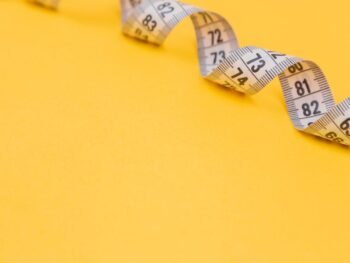Setting realistic weight loss goals is crucial for long-term success. Many people have the desire to lose weight, but they often set unrealistic expectations for themselves, which can lead to frustration and disappointment. In this article, we will discuss the importance of setting achievable goals and provide tips for doing so. We will also explore the science of weight loss, the role of a healthy diet and exercise, staying motivated, avoiding fad diets and quick fixes, tracking progress, seeking professional guidance, managing stress and sleep, and celebrating small victories along the way.
Key Takeaways
- Set realistic weight loss goals to avoid disappointment and frustration.
- Understanding the science of weight loss can help you make informed decisions about your diet and exercise routine.
- A healthy diet is crucial for weight loss and overall health.
- Exercise should be incorporated into your weight loss plan to increase calorie burn and improve overall fitness.
- Staying motivated can be challenging, but celebrating small victories along the way can help keep you on track.
Setting realistic weight loss goals
Setting realistic weight loss goals is essential because it allows you to create a plan that is achievable and sustainable. When you set unrealistic goals, such as losing 20 pounds in a month, you are setting yourself up for failure. Instead, focus on setting smaller, more attainable goals that can be reached over time. For example, aim to lose 1-2 pounds per week rather than trying to lose a large amount of weight all at once.
To set realistic weight loss goals, start by assessing your current situation. Take into account your current weight, body composition, and overall health. Consider any medical conditions or physical limitations that may affect your ability to lose weight. Once you have a clear understanding of where you are starting from, you can set goals that are appropriate for your individual circumstances.
Understanding the science of weight loss
To understand how weight loss works, it's important to grasp the basics of energy balance. Weight loss occurs when you consume fewer calories than you burn. This creates a calorie deficit, which forces your body to use stored fat as fuel.
Creating a calorie deficit can be achieved through a combination of diet and exercise. By reducing your calorie intake through a healthy diet and increasing your calorie expenditure through physical activity, you can create the necessary deficit for weight loss.
Importance of a healthy diet
A healthy diet plays a crucial role in weight loss. It provides your body with the nutrients it needs to function properly while also helping to control your calorie intake. When it comes to weight loss, it's important to focus on creating a calorie deficit, but that doesn't mean you should restrict yourself to a diet of only low-calorie foods.
Instead, aim for a balanced diet that includes a variety of nutrient-dense foods such as fruits, vegetables, whole grains, lean proteins, and healthy fats. These foods will provide you with the energy and nutrients you need while also helping to keep you feeling satisfied and full.
To create a healthy meal plan, start by determining your daily calorie needs. This can be done using an online calculator or by consulting with a registered dietitian. Once you have your calorie goal, you can then plan your meals and snacks accordingly. Be sure to include a mix of protein, carbohydrates, and fats in each meal and snack to help keep you satisfied and nourished.
Incorporating exercise into your weight loss plan
Exercise is an important component of any weight loss plan. Not only does it help to burn calories and create a calorie deficit, but it also has numerous other benefits for overall health and well-being.
When it comes to exercise for weight loss, it's important to find activities that you enjoy and that fit into your lifestyle. This will increase the likelihood that you will stick with your exercise routine long-term. Aim for a combination of cardiovascular exercise, such as walking or cycling, and strength training exercises to build muscle and boost your metabolism.
To incorporate exercise into your routine, start by setting realistic goals. If you are new to exercise, start with just a few days per week and gradually increase the frequency and intensity over time. Find activities that you enjoy and that fit into your schedule. Consider joining a gym or fitness class, or simply find ways to be more active throughout your day, such as taking the stairs instead of the elevator or going for a walk during your lunch break.
Tips for staying motivated

Staying motivated is key to achieving your weight loss goals. It's normal to have ups and downs along the way, but it's important to find ways to stay motivated even when things get tough.
One tip for staying motivated is to set small, achievable goals along the way. Celebrate each milestone and use it as motivation to keep going. For example, if your goal is to lose 20 pounds, set smaller goals of 5 pounds at a time and reward yourself when you reach each milestone.
Another tip is to find a support system. Surround yourself with people who will encourage and support you on your weight loss journey. This could be friends, family members, or even an online community of like-minded individuals. Having someone to share your successes and challenges with can make a big difference in staying motivated.
Avoiding fad diets and quick fixes
Fad diets and quick fixes may promise fast results, but they are not sustainable or healthy in the long run. These types of diets often restrict certain food groups or severely limit calorie intake, which can lead to nutrient deficiencies and other health problems.
Instead of falling for the latest fad diet, focus on making sustainable lifestyle changes that you can maintain long-term. This means adopting a balanced diet that includes a variety of foods and finding an exercise routine that you enjoy and can stick with.
Tracking your progress
Tracking your progress is important for staying motivated and making adjustments to your weight loss plan as needed. There are many ways to track progress, including weighing yourself regularly, taking measurements of your body, and keeping a food and exercise journal.
Weighing yourself regularly can help you see if you are making progress towards your weight loss goals. However, it's important to remember that the number on the scale is not the only measure of success. Taking measurements of your body, such as waist circumference or body fat percentage, can provide a more accurate picture of your progress.
Keeping a food and exercise journal can also be helpful for tracking progress. This allows you to see patterns in your eating and exercise habits and identify areas where you may need to make changes. It can also help you stay accountable to your goals and make adjustments as needed.
Seeking professional guidance
Seeking professional guidance can be beneficial for weight loss, especially if you have specific health concerns or are unsure where to start. A registered dietitian or nutritionist can help you create a personalized meal plan that meets your individual needs and goals. They can also provide guidance on portion sizes, food choices, and meal timing.
If you are new to exercise or have specific fitness goals, working with a personal trainer can be helpful. They can create a workout plan that is tailored to your needs and help you learn proper form and technique to prevent injury.
Managing stress and sleep for weight loss
Managing stress and getting enough sleep are often overlooked aspects of weight loss, but they play a crucial role in overall health and well-being. Chronic stress can lead to weight gain and make it more difficult to lose weight, while lack of sleep can disrupt hormones that regulate appetite and metabolism.
To manage stress, find healthy coping mechanisms such as exercise, meditation, or spending time with loved ones. Prioritize self-care activities that help you relax and unwind.
To improve sleep, establish a regular sleep schedule and create a relaxing bedtime routine. Avoid caffeine and electronic devices before bed, as they can interfere with sleep quality.
Celebrating small victories along the way
Celebrating small victories along the way is important for staying motivated and maintaining a positive mindset. Losing weight is a journey, and it's important to acknowledge and celebrate each milestone along the way.
Whether it's fitting into a smaller size of clothing, reaching a certain number on the scale, or completing a challenging workout, take the time to acknowledge and celebrate your achievements. This will help to keep you motivated and remind you of how far you have come.
Setting realistic weight loss goals is crucial for long-term success. By understanding the science of weight loss, incorporating a healthy diet and exercise into your routine, staying motivated, avoiding fad diets and quick fixes, tracking progress, seeking professional guidance, managing stress and sleep, and celebrating small victories along the way, you can create a sustainable plan for achieving your weight loss goals. Remember that weight loss is a journey, and it's important to be patient and kind to yourself along the way.
If you're looking to lose weight and are considering martial arts as a way to achieve your goals, you might find this article on Victory Martial Arts empowering for women and girls interesting. It explores how martial arts can break barriers and empower individuals, providing a unique perspective on the benefits of this discipline. Check it out here for insights into how martial arts can transform not only your physical health but also your mental and emotional well-being.
FAQs
What is the recommended amount of weight loss per week?
The recommended amount of weight loss per week is 1-2 pounds.
Is it safe to lose 20 pounds in a month?
Losing 20 pounds in a month is not considered safe as it requires a drastic calorie deficit and can lead to health complications.
What is a healthy rate of weight loss?
A healthy rate of weight loss is 1-2 pounds per week.
What are some healthy ways to lose weight?
Some healthy ways to lose weight include eating a balanced diet, exercising regularly, getting enough sleep, and reducing stress.
What are some unhealthy ways to lose weight?
Some unhealthy ways to lose weight include crash dieting, taking diet pills, and excessive exercise without proper nutrition.
What are the risks of losing weight too quickly?
The risks of losing weight too quickly include malnutrition, dehydration, muscle loss, and gallstones.
How can I lose weight in a healthy way?
You can lose weight in a healthy way by eating a balanced diet, exercising regularly, getting enough sleep, and reducing stress. It is also important to consult with a healthcare professional before starting any weight loss program.














